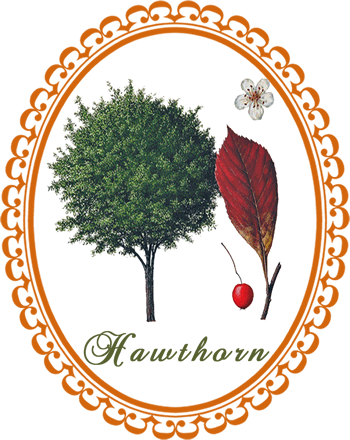
Hawthorn: helps to normalize heart function, bringing it to maximum efficiency. It is useful when there is heart failure or weakness, an irregular heartbeat or palpitations ...
Common Names: Hawthorn, May Bush, Thorn
Botanical Name: Crataegus monogyna
Family: Rosaceae
Plant Type: Hardy deciduous shrub
Parts Used: Ripe fruit (haws)
Flowering: Spring
The Genus Crataegus is comprised of some 280 species that have a widespread distribution throughout most of the temperate regions of the Northern Hemisphere. Crategus laevigata is native to Europe and Asia, while the closely related C. monogyna is indigenous only to Europe. Both species grow in open woodlands and pastures in sun to partial shade.
Description: Hawthorn is a large shrub or small tree with branches that are studded with spines. Foliage consists of dark green, wedge-shaped, deeply lobed leaves. Dense clusters of white, strong-smelling flowers are produced in spring and followed by bright to dark red, edible fruits (berries) that resemble crabapples.
Cultivation: Hawthorn is a small tree or large shrub. It is hardy to zone 3, prefers an alkaline pH, and grows best in rich, moist soil in full sun to part shade.
Harvesting: Collect leaves when young and fresh, the flowers when newly opened, and the berries in September and October, before the first frosts.
Hawthorn Magick
Fertility. Chastity. Fishing Magic. Happiness.
Gender: Masculine
Planet: Mars
Element: Fire
Hawthorn protects against lightning and damage from storms.
Tie sprigs of hawthorn to cradles to protect babies against evil and disease.
Carry hawthorn in a sachet when you go on a fishing trip to ensure a good catch.
Hawthorn bouquets are used at weddings to ensure health, happiness, and fertility.
Part of the tree fairy triad of Britain: "Oak, Ash and Thorn" and where all three trees grow together, you might see fairies.
Herbal Healing with Hawthorn
Medicinal Actions: Antispasmodic, cardiac, sedative, vasodilator
Medicinal Uses: Hawthorn has a tonic effect on the walls of the blood vessels, so it is valuable to those suffering from arteriosclerosis and resulting angina. Hawthorne has a balancing effect on blood pressure, whether high or low. Hawthorn will also benefit veins, helping with varicose veins, varicose eczema and phlebitis. The tea is good for nervous tension and sleeplessness.
Caution: Herbs can be effective, either alone or in combination with orthodox drugs, however it is wise to seek professional advice if you have a potentially serious heart condition such as angina, heart failure and high blood pressure.
Body Care with Hawthorn
- As a general tonic or to regulate abnormal heart rhythms, take 1 teaspoon hawthorn tincture three times daily.
- To soothe rattled nerves after a stressful day, drink 1 or 2 cups hawthorn decoction.
- To treat boils, sores and skin ulcers, make a poultice of flowering hawthorn tops and apply fresh, morning and evening.
Tincture: Either 200 g (7 oz) dried haws or 200 g dried flowering hawthorn tops in 1 litre (4 cups) vodka-water mix.
Decoction: Boil 30 g (1 oz) dried haws in 750 ml (3 cups) water for 15 minutes, then use standard method.
Poultice: Add very hot water to herb powder to make a paste, or simmer sufficient chopped fresh or dried herb to cover the area in a little water for 2 minutes, then squeeze out the water. Spread the powder or fresh-herb paste over your skin as hot as you can tolerate and bandage it in place with gauze. Leave it there for two to three hours, then repeat if necessary.
Source: The Essential Herbs Handbook by Lesley Bremness
If you appreciate the information provided,
please help keep this website running. Blessings!
© 2008-2022 aromaworx.ca. All rights reserved.

